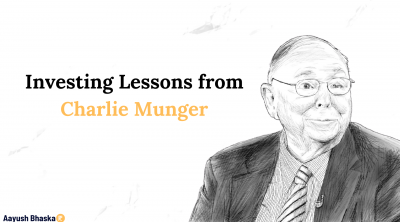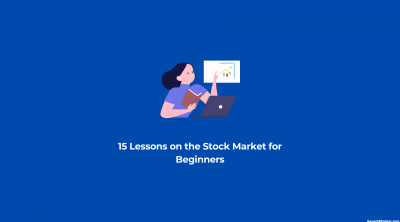Investing is dynamic participation in the financial marketplace instead of the passive buy-and-hold investment technique. An investor’s long-term profitability is the most crucial factor in determining their level of performance.
It simply takes a few moments online to uncover the adages “plan your trade; trade your plan” and “limit your deficits to a minimal” that may help anybody become a successful stock trader.
Such nuggets may appear more like a diversion than valuable guidance to novice traders. Those new to investing want to know how to become rich quickly.
However, it takes a while to understand the general concept of investing and the principles of becoming a successful investor.
Let’s check some essential principles and guidelines to help you become a better investor. More pertinent to understand is that their combined consequences are substantial.
Keeping these in mind, you will boost the chances of your financial success.
KEY TAKEAWAYS:
- Consider trading a job, not a pastime or side gig.
- Research as much as you can about the industry.
- Making a profit from trading is challenging, and the traits shared by the most experienced traders are pretty unusual.
- And over 80% of traders reportedly lose money and give up.
- Success necessitates locating tactics that result in a net gain in funds.
- When market circumstances shift, many traders find themselves unprepared.
- Traditional trading guidelines from the pros might help you maintain a laser focus on your bottom line.
- Try to avoid being disappointed by your company by setting reasonable goals.
Methods For Sustaining Profits Over Time:
Three intertwined abilities are necessary for sustained financial success.
The initial step is to develop a trading strategy based on the resources of tactics that generate more profit than losses.
Secondly, the market (profit and environment) might be moving in a bullish or bearish direction, and the tactics still need to work effectively.
In other terms, although many traders might profit under certain market situations, they are ultimately doomed to lose money since their techniques are not flexible enough to respond to the constantly shifting market environment.
The principles of trading are as follows:
All of the following guidelines are important individually, but their collective effect is far incredible.
Your ability as an investor to develop a successful trading business depends on your grasp of the relevance of these market trading principles and the interplay between them.
Moreover, your success in today’s volatile and cutthroat market depends on your ability to maintain self-control and focus while dealing with the inherent challenges of the profession.
If you remember them, you’ll increase the chances of earning surplus cash in the marketplaces.
Let’s dive deep into it.
1. Always have a plan before you trade:
An investor’s trading strategy should have a documented guideline outlining the parameters by which each deal will be entered, closed, and managed.
Today you can easily use technology that has made it simple to simulate trading scenarios before committing actual funds. For instance, Backtesting is the process of evaluating a trading strategy by applying it to past data to see whether it would have been successful.
Moreover, trading within the actual world may begin after a strategy has been devised. There will be moments when your trading strategy might fail.
Conquer the situation and begin again!
The trick is to stay with the strategy. Regardless of whether the transactions you make outside your trading plan are profitable, you are still engaging in bad trading techniques.
2. Utilizing technology to your favor, approach trading like a business commercial:
If you want to receive good returns, you need to treat investing like a profession, not a pastime or side gig. The dedication to study is not there when it is seen as a pastime.
The lack of consistent compensation might be annoying if you’re doing it for money.
Further, there are costs, losses, taxes, unpredictability, stress, and danger associated with trading since it is a business. Therefore, to succeed as an investor, you must think like a small company owner and devote time and energy to study and planning.
Competition is fierce in the trading industry. You can bet that the opposite party in a deal is using every technological edge at their disposal.
The options available to investors on charting systems for viewing and analyzing the markets are almost limitless. Using previous data for “backtesting” may help avoid making expensive mistakes.
You can easily keep tabs on transactions from any location by accessing market data through a smartphone.
Therefore, using commonplace technologies, such as a fast internet connection, is going to improve business results significantly. Making the most of modern tools and being abreast of emerging commodities may be a lot of fun.
3. Keep your trading funds safe and educate yourself about the marketplace:
It takes significant time and works to save sufficient funds to establish a trading account.
Keeping your trading money safe does not mean you will never have a lost deal. Every single trader will experience a lost transaction at some point.
That’s why avoiding danger and adopting all possible measures to keep your trading firm running are essential while attempting to keep money safe.
That is why consider it an opportunity for lifelong learning, and you should never stop seeking knowledge.
Recall that mastering the nuances of the industry is a never-ending endeavor!
Furthermore, you can also get an insight into the data, such as the significance of the various economic reports, by doing an in-depth study. It will help you hone your senses and pick up on subtleties by maintaining a solid focus and studying the market.
Markets react to developments in politics worldwide, breaking news, market indicators, and even the climate. The nature of the market is one of constant change.
The more experienced any trader is, the greater his knowledge of both historical and present market conditions.
4. Take the risk you can manage to lose and create a grounded reality strategy:
It is pertinent to verify that every penny in your trading account is completely disposable before you begin utilizing real cash. Or else, you should maintain putting money aside until it is available.
Trading account funds is inappropriate for household expenses like education or mortgage payments. It would help if you never kidded yourself into believing you are doing anything more than “borrowing” funds from these critical responsibilities.
It’s already terrible enough to lose money. The stakes are raised much higher if the money was unwisely gambled with.
Therefore, investing time and energy into creating a reliable trading strategy is in your best interest.
The “so simple it’s like printing cash” trade frauds that circulate online might be hard to resist. But you should construct your trading strategy based on data, not feelings or fantasies.
The patient investors may more easily wade through the vast amount of online content in a structured manner.
Think about it: if you wanted to switch careers, you’d have to spend a minimum of a year or more in school learning the ropes before you could apply for a job.
It takes at least as much effort and fact-based study to understand how to trade as it does to learn any other skill.
5. Always incorporate a stop-loss order:
A trader’s halt loss is the maximum sum of loss they are prepared to incur on any given deal.
Stop losses may be set in terms of either monetary or percentage values, but in any case, they serve to restrict the trader’s potential loss. Knowing that we could only lose X sum on any particular deal might alleviate a portion of the anxiety that comes with investing.
Even if this results in a profitable transaction, it would be unwise not to use a stop loss. Having a lost trade and withdrawing with a stop loss but still adhering to the guidelines of your trading strategy counts as successful trading.
While making a profit on every transaction would be ideal, this is seldom possible in practice. Therefore, losses and hazards may be mitigated using a safe stop loss.
6. When to step out of the market:
An inefficient trading strategy or an incompetent trader are the two leading causes for abandoning a trading position.
When back-testing a trading strategy, losses from an inefficient plan consistently exceed expectations.
It’s inevitable!
It might be possible that market conditions have shifted or volatility has subsided. Still, your trading strategy is not producing the desired results for unknown reasons.
Be calm and professional at all times. You can develop a new trading strategy, or the current one can be reevaluated and adjusted. An issue that requires fixing is a trading strategy that doesn’t generate profits. The termination of the trading industry is not inevitable.
You are a poor trader if you create a trading strategy but consistently deviate from it.
This issue may be exacerbated by environmental stress, bad habits, and inactivity. So, if you aren’t feeling 100% sure, it would be best to take a vacation from trading until you feel better.
Now that the obstacles have been removed, the trader may return to work.
7. Do not lose sight of the big picture while trading:
While investing, it’s essential to keep the larger picture in mind.
You should not be surprised by a lost transaction since it is inevitable. A successful transaction is simply the beginning of running a successful company. The sum of the earnings is what matters.
Losses and wins will less impact trading success if the trader recognizes them as inevitable. Having said that, it’s important to remember that a lost transaction is always around the corner, so it’s okay to celebrate a successful one.
Moreover, having a grounded perspective in trading is facilitated by setting reasonable expectations. You are putting yourself up for disappointment if you believe that you can become a multimillionaire.
Conclusion:
It is pertinent to determine just how much money you can afford to lose. You need to keep an eye on the potential loss of cash in every deal you make.
In times of market uncertainty, the effects of leverage on your transactions might be magnified.
That is why try to limit your use of leverage at these times to prevent losses from snowballing out of control.
Moreover, success in investing depends on your grasp of such trading principles and their interconnectedness.
Investing is challenging, but those with the self-control and perseverance to adhere to these principles will give themselves a better chance of triumph in a highly competitive market.
FAQs
Is It True That Most Inexperienced Traders End Up Losing Money?
Yes. Most day traders and newcomers give up after a brief time in the business.
Can Stock-Picking Investors Succeed Where the Market Fails?
It seems that, on average, the reply is not yes. When including transaction expenses and service charges, active investing techniques (i.e., stock selecting) often underperform the marketplace over the long term.
Indeed, the optimum approach for most long-term buy-and-holders is a passive index approach.
Which common human biases hurt traders’ performance?
Many cognitive factors and psychological biases that might negatively affect a trader’s performance have been found in behavioral finance.
However, one bias is loss aversion, which encourages investors to hold on to losing positions for too long and unnecessarily sell winning ones out of a concern of locking in a deficit.
Recency bias refers to the tendency to assign more weight to recent events and data, even if they may not represent broader, more general tendencies.








Leave a Reply